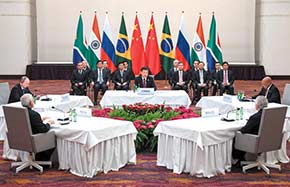Snowden storm stains US
For example, take the case of a policymaker in a major developing country - say, India - who adopts a policy to protect domestic interests. In case such a policy threatens American goals, the US could get dubious entities to call the policymaker over the phone or send him/her some e-mails. Using such communications, the US officials can then launch a phishing expedition across offshore banking centers to see if the politician has illegal accounts. And if the officials get any incriminating evidence, they can simply blackmail the policymaker into complying with the dictates of the US administration or destroy his career by leaking information about his/her ill-gotten wealth.
The unfettered access of the US to offshore banking data means that policymakers across the globe, many of whom are corrupt, are at the constant risk of exposure if they refuse to play ball with the US at the cost of their domestic industries.
Since major international Internet service providers are based in the US, the private e-mails and phone calls of more than 2 billion people across the globe can be made available to US authorities and their NATO allies. This could include details about their personal lives, which could be leaked to the media whenever they take a firm stance to protect their countries' interests against the diktats of the US or its NATO allies. The Iraq "Oil for Food" scandal was an apt example of how a so-called independent commission (headed by former US Federal Reserve chairman Paul Volcker) found only those people guilty of malpractice who were known to be resisting US pressure.
The Volcker report reportedly preferred not to name a prominent Indian politician, considered close to the US, even though she was one of the suspected beneficiaries of the scandal. But the report didn't show a similar forbearance toward former Indian foreign minister K. Natwar Singh, who is a life-long proponent of non-alignment, a movement that the US and NATO detest. Ultimately, a lobby within the Indian government forced Natwar Singh to resign from the federal cabinet, much to the relief of those who found his adherence to nonpartisan principles irksome.
How many independent-minded politicians across the globe have fallen prey to the information gleaned by the NSA? How many companies based in the US and other NATO member countries have benefited from illegally collected data on their competitors in other countries?
Since politicians in the US and other NATO member states can pretend to be acting against potential terrorist funds to hack the accounts of individuals and companies in other countries for the benefit of their local enterprises, it would be naive to think that they have not used such information to also promote their political interests.
Therefore, the use of the NSA as a phishing net, designed to get information from hundreds of millions of individuals and companies wholly unrelated to terrorism, need not merely be condemned, but also subjected to penalties.
The author is vice-chair of Manipal Advanced Research Group and UNESCO peace chair, and professor of geopolitics at Manipal University, India.





















